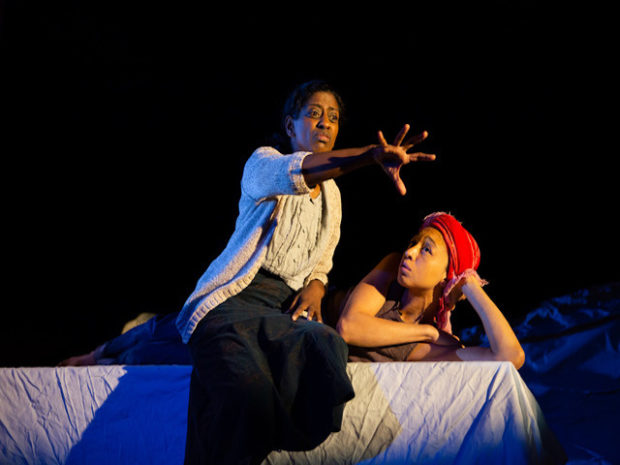You have no items in your cart. Want to get some nice things?
Go shopping
Going through a one-way journey. Going through dramatic changes and traumatic experiences. Going through national borders and language barriers. This is what young Nour has to endure in Going Through, the UK version of Estelle Savasta’s French play Traversée, which premiered at the Bush Theatre under the impeccable direction of Omar Elerian. The journey is as humanly intense as it is visually absorbing.
The cast is made up of only two actors, and the set design consists of a handful of white sliding panels. But then again there’s spoken word, British Sign Language, face expressions and meaningful objects. There’s audio, creative captioning, music, (mesmeric) lights and projections. The result is extraordinary. With the best use of its simple elements, the play (literally) takes us places, through visionary and poetic storytelling. It’s one of those productions where everything, including the font of the captions, has a deep significance, and it’s a pleasure to see such a meaningful attention to detail.
Nour (Charmaine Wombwell) lives with Youmna (Nadia Nadarajah), the woman who raised her with tenderness and care in a tiny little house. Their peaceful life is brought to a sudden end when a man comes to pick Nour up, to drive her to her real mother, somewhere far away. Disguised as a boy, tossed from one person to another, travelling in one means of transport after the other, Nour undertakes a journey where uncertainty is the only constant.
The first half of the play is quite a-temporal: we are given no details of Nour’s age or the countries she journeys through. While potentially unsettling, this works well in the context of heavily focalised narration: we don’t know where Nour is going because she doesn’t know herself. We can’t tell how long she spends travelling, or who are the people she meets, because she has no clue. The agony of ignorance is as real for her just as it is for us. In the third and final part, things become factual, concrete and measurable, giving immediacy to Nour’s experience as a child migrant in the UK. Especially at the end, we are shown the shocking reality of having to leave everything behind and to be reduced to a human being with no papers. Nour manages to find a new dignity and identity in pursuing a career as a midwife, but this mitigates only in part the lacerating sadness of her story.
Utterly beautiful is the poetic language that runs through the script, transposed from the original French by brilliant translator Kirsten Hazel Smith. Lines like “Time stretches out like a cat that has slept too much” or “[Her] hand on my back as if she was smoothing out a beautiful, crumpled-up love letter” could easily be taken from a poem by Sylvia Plath. Each and every word comes with its own weight, and by taking a variety of shapes (gestures, text, spoken word), it makes the script feel all the more precious.
Both Nadarajah and Wombwell deliver arresting performances. Informed by their personal experience and training in physical theatre, they embody the real essence of motherly love on the one hand and the fear of isolation on the other. They bring a further level of accomplishment to a thoroughly well-crafted production.
Going Through runs until 27 April at the Bush Theatre.
About Anna Zanetti
Anna graduated from the University of Oxford with a BA (Hons) in Classics, specialising in Literature, Aesthetics and Ancient Art. Currently based in London, she has eclectic interests, including avant-garde art, cycling, reading, contemporary dance, opera, (watching) rugby, and anything to do with Latin. She writes for The Oxford Culture Review, Theatre Bubble and A Younger Theatre, as well as keeping a personal blog about arts and culture.
- Web |
- More Posts(10)




